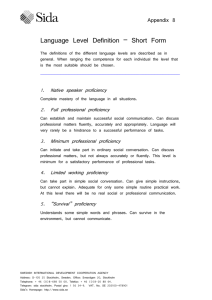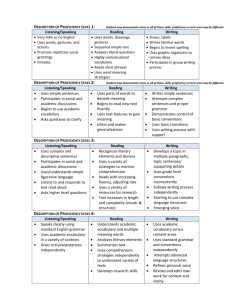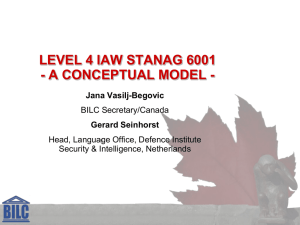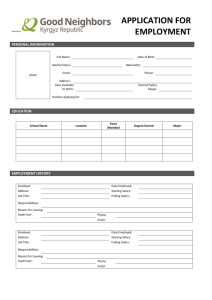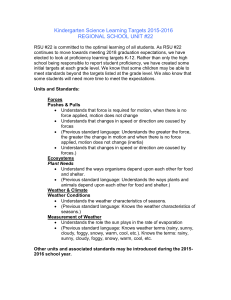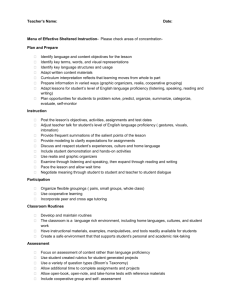1. Native speaker proficiency
advertisement
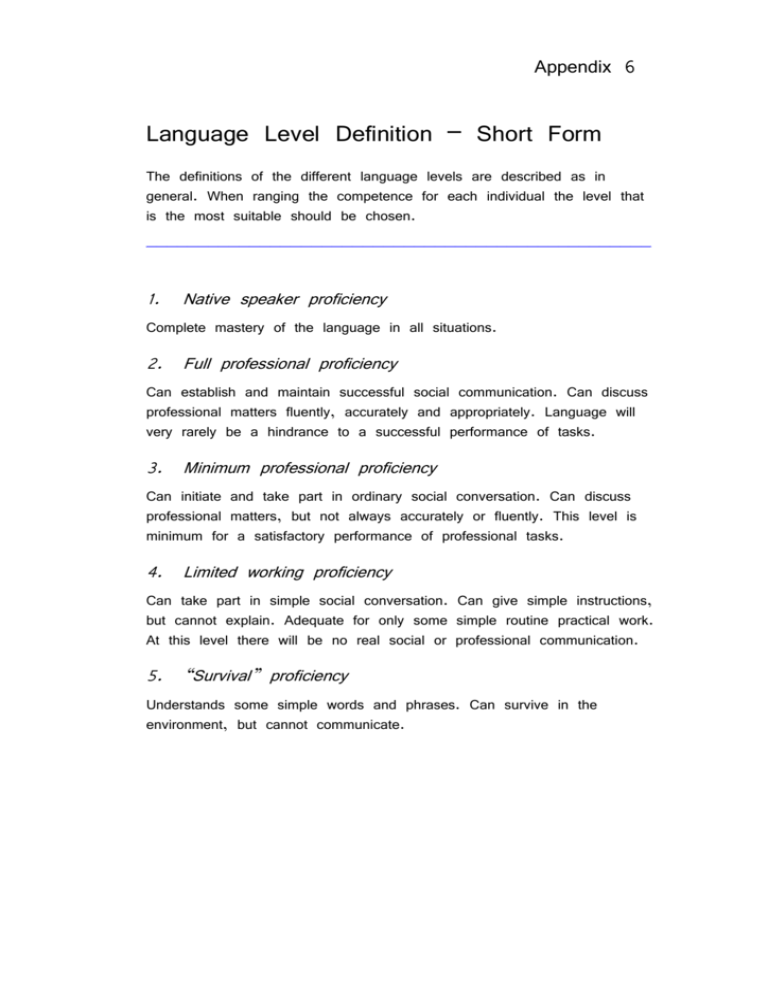
Appendix 6 Language Level Definition – Short Form The definitions of the different language levels are described as in general. When ranging the competence for each individual the level that is the most suitable should be chosen. _________________________________________________ 1. Native speaker proficiency Complete mastery of the language in all situations. 2. Full professional proficiency Can establish and maintain successful social communication. Can discuss professional matters fluently, accurately and appropriately. Language will very rarely be a hindrance to a successful performance of tasks. 3. Minimum professional proficiency Can initiate and take part in ordinary social conversation. Can discuss professional matters, but not always accurately or fluently. This level is minimum for a satisfactory performance of professional tasks. 4. Limited working proficiency Can take part in simple social conversation. Can give simple instructions, but cannot explain. Adequate for only some simple routine practical work. At this level there will be no real social or professional communication. 5. “Survival” proficiency Understands some simple words and phrases. Can survive in the environment, but cannot communicate. 2 (6) 1. Native Speaker Proficiency – Full Definition Complete mastery of the language in all situations _________________________________________________ Listening comprehension and speech equivalent to that of a wellinformed, educated native speaker of the language. Can establish and maintain sophisticated and successful social communication. Can recognise and suitably respond to subtle differences in the expression of politeness, respect and familiarity. Can describe and discuss processes and situations fluently, accurately and appropriately – even colourfully and amusingly. Can explain and discuss the technical and professional concepts and processes of her/his job in detail. Can lecture, chair and actively take part in meetings – even formal ones. Can propose and argue for a course of action clearly, persuasively and convincingly. Can interpret and negotiate the finer and more sensitive details of a contract or agreement. Can read and understand abstract texts, all literary styles and even some esoteric forms of the language. Can write clear and correct letters and reports, prepare the agenda and minutes of meetings, compose terms of reference or draft a contract, using appropriate forms of the language. Note: Native speaker proficiency is an astonishingly high level of competence for a non-native. Language Definitions 2 3 (6) 2. Full Professional Proficiency – Full Definition Can establish and maintain successful social communication. Can discuss professional matters fluently, accurately and appropriately. Language will very rarely be a hindrance to a successful performance of tasks. _________________________________________________ Can establish and maintain successful communication in all ordinary social and professional situations. Speech fluent and accurate. Can recognise and suitably respond to differences in the expression of politeness, respect and familiarity. Can describe and discuss activities and situations fluently and clearly. Can explain and discuss all normal technical and professional questions with only very occasional difficulty. When properly prepared, can act as chairman or actively contribute to meetings. Can propose and argue for a course of action clearly and well, though perhaps with some lack of elegance. Can interpret and negotiate the finer and more sensitive details of a contract or agreement. Understands all ordinary texts addressed to the general reader. Understands all written styles and forms of the language pertinent to his job. Can write clear and correct letters and reports, prepare the agenda and minutes of meetings with few errors, but with a vocabulary less vivid and apt than that of an educated native speaker. Can draft proposed terms of an agreement or contract. Can compose terms of reference or draft a contract, using appropriate forms of the language. Language Definitions 3 4 (6) 3. Minimum Professional Proficiency – Full Definition Can initiate and take part in ordinary social conversation. Can discuss professional matters, but not always accurately or fluently. This level is minimum for a satisfactory performance of professional tasks. _________________________________________________ Can initiate and take part in ordinary social conversation with reasonable success. May not notice and will not be able to suitably respond to subtle distinctions in meaning. Can describe and discuss situations and activities fairly fluently and accurately. Can discuss work procedures and practical questions with close colleagues. Will find it difficult to explain theoretical concepts. Any formal or more public communication will be difficult. Language will seem awkward and lacking in finesse. Lack of control of grammar and a limited vocabulary affects performance. Understands most of what is meant in ordinary texts addressed to the general reader, as well as simple routine letters, reports and technical materials in own field. For more accurate understanding, frequent use of the dictionary is necessary. There will be some misunderstanding. Can write simple letters, routine memos and routine reports, but with rather many errors. Cannot draft contracts or agreements, or any materials where precision is vital – for example handbooks or instruction sheets. Language Definitions 4 5 (6) 4. Limited Working Proficiency – Full Definition Can take part in simple social conversation. Can give simple instructions, but cannot explain. Adequate for only some simple routine practical work. At this level there will be no real social or professional communication. _________________________________________________ Can understand and respond to simple social conversations addressed to him and spoken clearly. Must ask for repetition and simplification. Can understand the gist of most conversations between native speakers about ordinary everyday things, but cannot really take an active part. Lack of words and grammar means he can only express himself simply and crudely, and with many errors. Can demonstrate a technique and give simple technical instructions but cannot discuss technical or professional questions reliably. Cannot explain theoretic concepts. Any sort of public or formal performance will be painful to both parties. Understands the general meaning of very simple written language dealing with ordinary familiar things. Extensive use of a dictionary is necessary for understanding routine business letters, newspapers, or any textbook, handbook or other written materials in his own field. Can write only very simple informal notes or letters or, for example, fill in very simple routine e reports. There will be many errors. Language Definitions 5 6 (6) 5. “Survival” Proficiency – Full Definition Understands some simple words and phrases. Can survive in the environment, but cannot communicate. __________________________________________________________ Understands some simple words and phrases if spoken slowly, clearly and directly to her/him. Needs frequent repetition, and even then will often misunderstand or be at a complete loss as to what is meant. At any kind of meeting or discussion, he will not understand what is going on and so be unable to contribute anything. Cannot understand even the general meaning of any ordinary texts, or of reports, instructions or handbookds in own field. This level is totally inadequate for any sort of work situation unless interpreters are constantly at hand, and full translations of texts are immediately avilable for side-to-side comparison. Language Definitions 6
